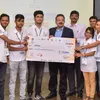The cool factor: Shell Foundation-backed startup Inficold is preserving India’s fruits, vegetables, milk
From building cooling technologies for Intel to working on eco-friendly cooling solutions with state governments, startup Inficold is solving the challenge of food wastage due to lack of low-cost cooling tech.
While the government is doing its bit to help agriculture flourish, its focus is mostly on providing pre-harvest subsidies (for fertilisers, irrigation and seeds). Yet, in the absence of a concrete post-harvest mechanism, the chances of reducing loan waivers remain low.
Wastage of produce (fruits, vegetables and milk) is a huge loss to a farmer. Especially since the incidence of cold storage at farms is technically zero in India. According to a report, India wastes 16 per cent of its agricultural produce yearly.
Noida-based Inficold has developed a retrofittable thermal energy storage technology for storing cooling in a low-cost medium such as water to ice. The USA-patented technology is designed to use solar electric energy to make ice, and later use it for cooling purposes.

Team Inficold
Inficold’s products enable the application of thermal storage for virtually any cooling needs, be it milk, cold storage, air conditioning and vaccine refrigeration, without making any major modifications to existing cooling hardware.
Founded in 2015, the startup has partnered with the National Institute of Solar Energy to jointly integrate solar photovoltaics to Inficold’s thermal storage for developing cold storage and milk coolers.
Currently focussing on hardware innovation, Inficold sells its equipment to those requiring cold chain.
The pro-team
Destiny brought co-founders Nitin Goel and Himanshu Pokharna together. Both had roots in agricultural – Nitin’s father is a fruit and vegetable wholesaler in a village in Uttar Pradesh. And Himanshu’s (50) father was a scientist at Indian Council of Agricultural Research in Rajasthan.
Nitin did BTech from IIT Bombay, and PhD in solar cooling from the University of Florida while Himanshu, also an IIT Bombay graduate, did his PhD in nuclear engineering from Purdue University and MBA from University of Penn Wharton School of Business.
Before starting up, Himanshu and Nitin worked together at Intel, developing an electronic cooling system for laptops.
Their partnership continued when Himanshu cofounded Sheetak Energy to develop cooling agents for Chotukool (a refrigerator by Godrej and Boyce); and he recruited Nitin as the India head. They later started Inficold together.
“An unreliable cold chain was always at the back of our minds, thus we founded Inficold to apply our technical expertise in solving the persistent problem of food wastage and distressed sales,” Nitin says.
The team now has more than 40 employees, including mechanical, electrical and software engineers.
Solar for cooling
“Solar is one of the few reliable and renewable sources of energy which needs to be stored in non-sunshine hours,” Nitin says.
Inficold uses solar energy to generate electricity, and run compressors. The ice formed is in turn used to cool fruits, vegetables and milk.
“Inficold originates from the word, ‘infinite cold.’ It signifies the use of an infinite source of solar energy into cold,” says Nitin.
Inficold is not changing the way cooling is provided either in cold storage or even air conditioning. A thermal storage is installed between existing outdoor and indoor units of a cooling system. Compressors in the outdoor unit generate cooling from electricity which is stored in the form of ice inside the thermal storage.

Inficold's Cold Vault
When cooling is required, refrigerants flow to the indoor unit in a seamless integration. As the thermal storage is externally mounted, its size is not limited to the walls which is a limitation with the more universally-used eutectic plates. This technology can be integrated on any cooling application without changing the way the cooling is delivered.
The startup launched its solar integrated milk chiller and cold storage systems in April 2019.
Their tie-up with the National Institute of Solar Energy has helped them partner with state governments with the primary goal of developing and characterising solar technologies in India. These solar cold storage and milk chiller solutions are being installed in districts of Assam, Karnataka, Kerala, Maharashtra and Tripura.
“Our target audience currently are private and cooperative dairies, dairy farms, FPOs and farmers across the country,” Nitin says.
Their products include solar milk chillers, solar instant milk chillers, 5 and 10 MT solar cold-storage and 30 MT solar cold-storage.
“All solutions assist the farmer in logistics and power saving, and the power to negotiate better at the time of selling produce,” he adds.
Growing in the non-renewable sector
With 15 on-ground installations, Inficold is now expecting to expand installations by “3x in the next couple of months,” claims Nitin.
For a typical 5 MT cold storage, Inficold roughly charges Rs 14 lakh.
While the founders made an initial investment of Rs 40 lakh each, Inficold has been backed by Shell Foundation for the past three years. They have received close to a million dollars from them. Three years ago, Inficold also received a $250,000 investment from Sangam Ventures.

Inside an Inficold cold storage
The cooling market
According to Associated Chambers of Commerce and Industry of India (ASSOCHAM), India only has 21 percent penetration of the cold chain in dairy against a global average of 61 per cent. Annual production of 180 million tons of milk requires 250,000 such solar milk cooling mechanisms in India, which translates to a Rs 70,000 crore market.
“There is virtually no cold chain for fruits and vegetables except apples, and India annually produces 266 million tonnes of fruits and vegetables,” Nitin adds.
Inficold claims to be the only company which commercially sells solar integrated milk coolers. As far as solar cold storages are concerned, companies like Ecozen and IceMake have thermal storage integrated in the form of eutectic plates.
Future plans
“Our target revenue for FY 2019-20 is Rs 20 crore. We plan to install 100 units of solar milk chillers and cold storage this year,” Nitin adds. The company is also actively looking at raising equity funding for growth and expansion.
(Edited by Suruchi Kapur Gomes)









